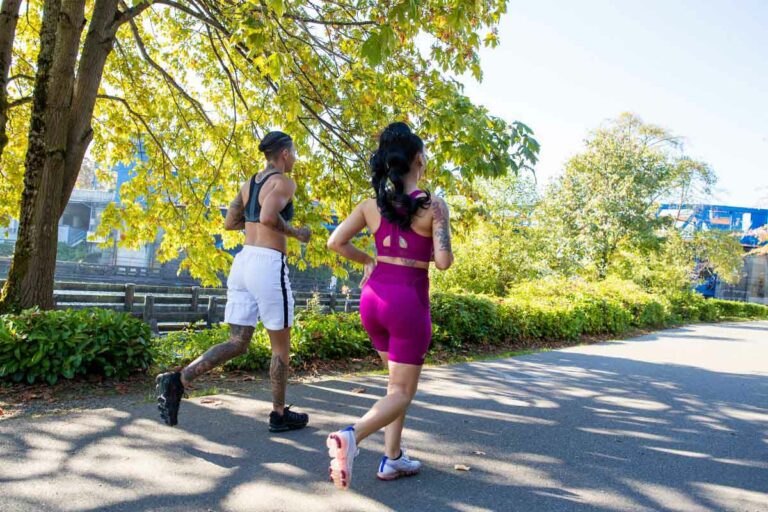Fueling for Success: How to Nourish Your Body During a Half Marathon

Are you wondering whether you need to fuel during a half marathon? The answer is yes! Proper fueling during a half marathon is essential to ensure you have enough energy to complete the race.
This article will explain why fueling is important and provide tips on fueling effectively during a half marathon.
The most important aspects of half marathon fueling are what to fuel with and when.
Why Fuel During A Half Marathon?
The main reason to fuel during a half-marathon is its length. While short enough that some runners may not need fuel at all, the majority of people will find their energy lacking in the last quarter without it.
- Some people may not feel the need to fuel during a half-marathon, and that’s okay.
- However, keeping your glycogen levels at a reasonable level is always beneficial. This ensures an easier run and a smooth recovery.
Your body can store up to ninety minutes worth of glycogen before running out. As the average half-marathon takes about two hours to complete, fueling along the way is essential.
- The two main sources of fuel for long runs are fats and carbohydrates. Making smart use of both will ensure the best results for your half-marathon.
- Using fat as a fuel during a half-marathon isn’t really an option. Fats break down slowly, meaning they aren’t great as a source of immediate energy during your run.
Training your body with fats will improve your running performance in the long run. Keeping a healthy balance of fat in your diet will lead to a better time during your half-marathon.
This leaves carbohydrates as the best source of fuel during a half-marathon. Specifically, sugars are the most effective kind of carb as they are already in the form of glucose.
Hydrate consistently:
- Stay hydrated by regularly sipping water or sports drinks throughout the race.
- This will help you maintain your energy and avoid dehydration.
There are a number of different types of fuel that are suitable for half-marathon runners like gels, chews, sports drinks, and even things like whole foods and snacks. So long as it gives you energy, it can work for you.
From Start to Finish: When To Fuel?
Getting the calories before you start to get tired is essential. If you’re tired, it’s already too late. By keeping your energy levels high throughout the half-marathon, you will see better results across the board.
- Using a pre-workout before the race begins is a great way to start with a kick of energy. Make sure to know your limits and not misuse this energy, which will result in burnout.
- After that, refuel every 45 minutes to an hour. The exact time will vary from person to person, so keep an eye on when you get tired while training and use that as a reference.
The fuel will start helping before it’s even really been digested. Once the sugar from a sports drink or gel hits your tongue, your brain will immediately know that energy is on its way.
Don’t overdo it:
- While fueling during the race is vital, it’s also important not to overdo it.
- What if you drink too much? You need to consider your pee breaks.
- What if you consume too much food? It can lead to digestive issues that end your race, and we don’t want to deal with runner’s trots!
This will steer you away from ideas of energy conservation, keeping your body fresh and ready.
Example Fueling Plan
For those in need, here is an example fueling plan. Remember that the actual times will vary depending on you, so learn what your body wants from you and when beforehand.
- Start with a good breakfast, full of carbs
- Take a pre-workout before the race for an extra kick
- Have a gel, chew, or whole food snack every 45-60 minutes
- At the eight-mile mark, taking fuel containing caffeine can help keep you alert for the final stretch
Pay attention to your body’s needs:
- Listen to your body’s hunger and thirst cues and adjust your fueling plan accordingly.
- It’s good to fuel consistently throughout the race (but not to the point where you feel uncomfortable or sluggish!).
Maximize Your Energy: What Fuels To Use?
There are many different types of fuels available for half-marathon runners. The main ones include gels, chews, sports drinks, whole foods, and things high in caffeine.
Each of these has their own good and bad points, so make sure you try them out before the half-marathon to see what works best for you.
Experiment with different fueling strategies:
- Try different fueling options such as gels, sports drinks, and snacks during training to see what works best for you.
- This will help you determine the best fueling plan for race day.
1. Gels
There is a huge range of gels out there, with even a few more natural options to choose from.
- Gels can occasionally lead to gastrointestinal problems, as they are often high in fructose.
- Make sure you try out lots of different brands to find the one that works for you.
Start using them during training to get used to them. Then, when it comes to the day, you will be fully prepared.
You don’t want to end up with an upset stomach during your half-marathon.
2. Chews
These are a great alternative to gels for people that get GI problems from all of them.
However, they come with a few issues of their own:
- Firstly, you will have to get used to them. Chewing while running can be a challenge. The jolting movements can interrupt your flow or make you bite yourself.
- Additionally, they don’t offer as much energy as a typical gel, so keep that in mind when planning your fueling quantities.
3. Sports Drinks
Sports drinks help to replace lost glycogen in the same way that the other options do. They also come with the added benefit of electrolytes, which help your body to recover.
Along with this, a sports drink will help hydrate you and replenish missing water and salt from sweat. This makes them a great choice for fuel in a half-marathon.
To ensure the best results, choose one high in carbs. This will give you the most energy for the run.

Maximize Your Performance: What to Do Before The Half Marathon
Your fueling journey should ideally begin long before the day of the half-marathon. While taking fuel during the race is important, making sure your body is prepared is just as necessary.
Start fueling well before the race:
- Eating a balanced diet and hydrating correctly in the days leading up to the half marathon is important.
- That ensures your body is well-fueled and hydrated for the race.
- Optimize your carb intake during the days before the race.
- Get your body used to it, and find out how much you can eat without having any problems.
- When carb loading, it is easy for inexperienced people to encounter gastrointestinal distress.
Test your limits slowly, finding over time the optimal amount to consume. This will give you the best chances on the day.
To help, keep a food diary or record of what you eat and its effects. This will let you look back on your diet and pick the best choice.
Final Thoughts
You can improve your half marathon times with a good fueling strategy. So for the best performance:
- experiment with different fueling strategies during training
- start fueling well before the race
- pay attention to your body’s needs during the race
No matter whether you use gels, chews, drinks, or anything else, make sure to find the fuel that works for you.
And, of course, you need to get your energy levels back after a race. We also have an article covering post-run nutrition: What to eat after a run for recovery.






